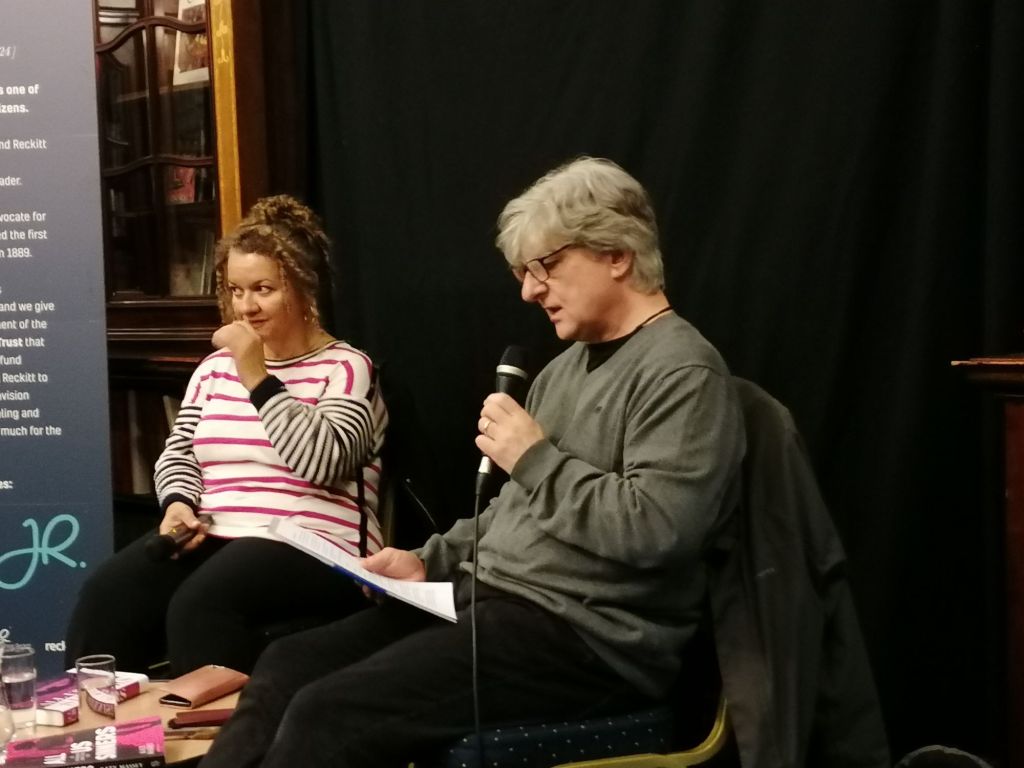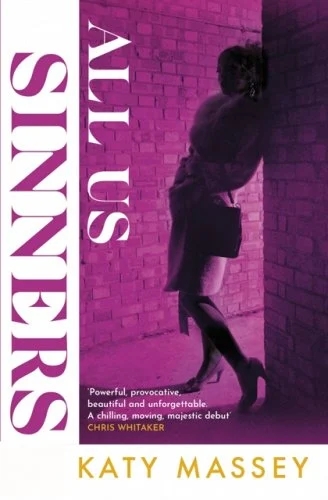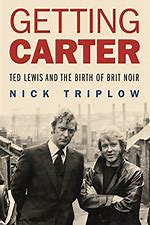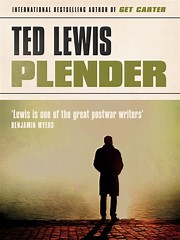On Wednesday 20 March Katy Massey https://katymassey.com/ @TangledRoots1 was the guest of Hull Noir https://www.hullnoir.com/ @HullNoir to talk about her debut crime novel All us Sinners and her writing career in general. Host for the evening and the man asking the questions was local crime author Nick Triplow @nicktriplow a co-creator of Hull Noir.
In reviews I generally refer to writers as ‘the author’ but as we have met and even gone to the pub together, I will take the liberty of referring to her as the more intimate Katy.
The event, including a Q&A session ran for an hour but there follows a flavour of what was discussed.

Background
The novel selects some from aspects of Katy’s life. Her mother worked in the sex industry, running a successful brothel in Leeds during the 1980s. Katy wanted to write about the women who worked there, they are not the stereotypes portrayed in fiction. They are just ordinary people, women working hard for their families under difficult circumstances. Putting forward the case for discrete, safe, well-run brothels which would have been important as the time the novel is set.
The novel is set in 1977 in a Leeds that is living under the shadow cast by The Yorkshire Ripper. He (like Jack the Ripper) when mentioned within stories, tends to drown out everything within the narrative, whereas she wants to reflect the terror felt by women at the time. Wanting to bring something unique to the story, an angle not pursued by other writers, where his existence is felt in the North, but he hasn’t reached the level of national infamy he was to achieve. He is a character in the novel though.
Characters
Maureen believes she is in control and very is street smart, but not as much as she thinks. The intention was to show that the harder the front a people show the outside world, the more vulnerable they are when this façade is taken away. The hard front is the result of what people have done to Maureen, but the vulnerable woman beneath is more likeable. She is a woman of complicated relationships with those around her. Mick is a policeman, around 10 years older, has known Maureen for years and is quite paternal. She sees him as a protector, but he is tempted, seeing her as a woman. A transactional relationship and one ‘across the tracks’.
Katy is deliberately looking to give a voice to characters whose story is not often told, people who are marginalised. She knows the world she is writing about, so can bring that authenticity to the storytelling. Also wanting to acknowledge that since the time the novel in which the novel is set, life has moved on, but all women remain vulnerable and deep down, attitudes have hardly changed.
Too many crime novels open with a naked or near naked prostitute, who has been murdered and never gets an opportunity to speak. In All us Sinners the story begins with the jeopardy, an attacked prostitute but one who gets to speak to the reader and can tell her story.
Setting
Nick commented on how incredibly evocative the novel is of the time and place in which it is set. How important was the relationship of Maureen, her city and specifically her neighbourhood? Katy said it was quite important that she had known nothing else, but Mick has great experience, with him bringing a much broader world view to the story. Mick’s life has been forged by religion, legitimate society and service to the community, yet Maureen had a hard dragged up existence selling what she has left to sell. There’s a sense of being trapped in Leeds, which is all she knows. Nick says this made it wonderfully claustrophobic, with the storyline leaving Leeds only twice.
Katy said for her it was important to create a sense of a community, this being part of race politics. Katy grew up mixed race, in a diverse part of Leeds and yet, she felt that she didn’t read enough books that reflect the mixing pot she experienced. Yes, there are black and Asian voices in literature, but they tend to concentrate on their section of the wider society. Whereas she wanted to give a more soap opera feel to the community, with the epicentre of community life being in Jamaican Linford’s café, he being a man with fingers in many pies.
The technical aspects of writing
As a debut novelist how conscious was she of finding her own unique voice, distinct from her work as a journalist and her memoir? Not a conscious effort at all! She just let the story guide her on tone and style as she learned to write a novel. Not being steeped in a crime writing background or having read much of the genre, she didn’t realise she was writing a crime novel, there was no specific intent from the outset. It was her editor who guided her on the technical aspects of writing within the genre.
Writing as a journalist is very different to writing a novel. Its more focussed with shorter sentences which are easy to comprehend.
Memoir
Are We Home Yet came about because of the feeling that she was burning out. Katy managed to get funding to do a MA at Sunderland and the study brought a sense of reawakening and so refreshed, her thoughts moved on to doing a PhD. The PhD thesis then became the basis for the memoir with little change. It took 11 years between writing and publishing, partly down to timing as the bottom had fallen out of the ‘misery memoir’ market. Then in 2020 she saw an opportunity, a publisher (Jacaranda Books) asking for submissions wanting to publish 20 pieces by writers of colour in that year. It was accepted and with the Windrush Generation fresh in everyone’s minds the timing was perfect.
All us Sinners can be purchased via the publisher’s website here
Are we Home Yet can be purchased direct from the publisher here
The author

Katy Massey was a journalist for many years before studying for an MA and PhD in Creative Writing. Her memoir, Are We Home Yet? was published in 2020 and praised by Bernardine Evaristo as ‘a gem’. It was shortlisted for the Jhalak Prize and the Portico Prize. In addition, her fiction and nonfiction work has been widely anthologised, including Common People edited by Kit de Waal, The Place for Me, and speculative collection Glimpse. All Us Sinners is her first novel, an unusual take on the crime genre featuring Maureen, a tough but tender-hearted brothel-keeper in 1970s Leeds. She is unexpectedly drawn into investigating the killing of a friend’s son, events which take place against the disturbing backdrop of the Yorkshire Ripper’s murder spree.
Source: Publisher’s website



